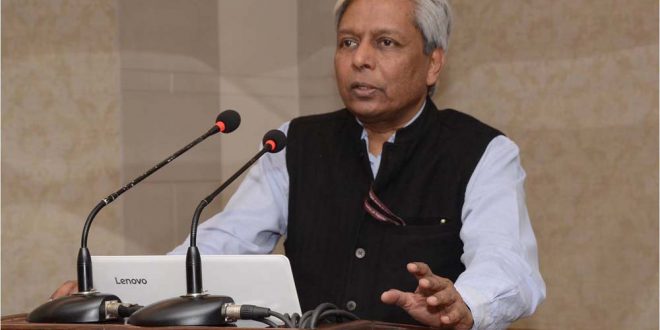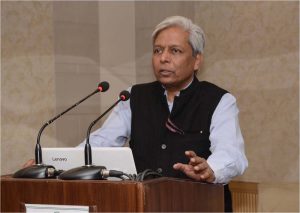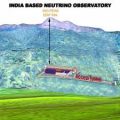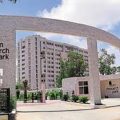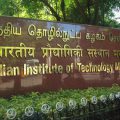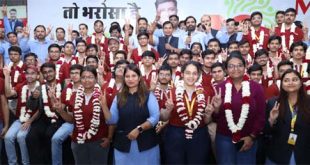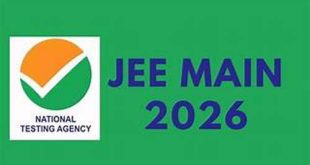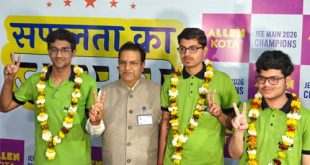Padma Shri Prof. K.Vijay Raghavan said, we connect science to society and society to science. His research focuses on the Neuro muscular System.
Alpana Saha
Newswave @New Delhi
Prof. K.Vijay Raghavan former secretary of the Deptt of Biotechnology (DBT) appointed the Principal Scientific Adviser to the Government of India (PSA).
Krishnaswamy VijayRaghavan is the Fellow of the Royal Society (FRS). He is a distinguished Professor and former Director of the National Centre for Biological Sciences. On 26 Mar 2018, GOI, appointed him as the Principle Scientific Adviser to succeed distinguished R.Chidamabaram. He was conferred the Padma Shri by the Govt. of India on 26 Jan, 2013.
In April 2014 he was elected as a Foreign Associate of the US National Academy of Sciences. He is distinguished Professor in the field of developmental.
His fields of specialization are developmental Biology, Genetics and Neurogenetics. His research primarily focuses on the important principles and mechanisms that control nervous system and muscles during development and how these neuro muscular systems direct specific locomotor behaviors.
This was achieved by using the fruit fly Drosophila Melanogaster as a model system. By patterning the segmental organization of the fly body plan, his research was able to shed more light on the functions of Hox genes in directing neuromuscular connectivity and motor behaviors.
He is on the Management Board of the International Centre for Theoretical Sciences (ICTS). VijayRaghavan is also a director of the Centre for Cellular and Molecular Platforms. He is a member of the Board of Governors of the Okinawa Institute of Science and Technology, the Advisory Committee, the Janelia Farm Research Centre of the HHMI, and a Senior Editor of the journal eLife.
Prof Ashutosh Sharma Secretary the DST and DBT congratulated Prof. K VijayRaghavan. He said we all greatly look forward to his able leadership.
Dr Shailja Gupta, Senior Adviser DBT congratulated him and said, “First appointment to the post of PSA out the Atomic or Space and first from life sciences faculty.”
S&T can be the fulcrum for change
“It is a great responsibility, working together we have our task cut out. Connect science to society and society to science. S&T can be the fulcrum for change: Agri, health, environment and development.”
– Prof Vijay Raghavan, PSA
The PSA’s Office was set-up in November, 1999 primarily, to:
- Evolve polices, strategies and missions for the generation of innovations and support systems for multiple applications,
- Generate science and technology tasks in critical infrastructure, economic and social sectors in partnership with Govt. deptt, institutions and industry.
- Function as the Secretariat to the Scientific Advisory Committee to the Cabinet, with the Principal Scientific Adviser to the GoI as its Chairman.
Multi-departmental Role of PSA
The Principal Scientific Adviser (PSA) to the GOI has a multi-departmental role. The scientific business of the government has been divided into many scientific departments, with each department having its well-defined area. There are S&T challenges and subjects that go beyond the individual scientific departments.
Quite often, the challenge could be of security or strategic importance to the country. The tasks of the PSA’s Office, therefore involve creation of missions and also undertake multi-departmental, multi-institutional projects in strategic, technology and other areas of economic/ social relevance.
To address S&T challenges of national importance, Office of PSA draws critical inputs and suggestions from a large cross section of expertise, comprising science and technology experts, policy makers, management and financial experts from a variety of stakeholders including government departments, academia, industry, non-governmental organizations and individual domain experts.
The inputs are drawn through formal means of structured brain-storming sessions involving relevant experts drawn from all over India, and then prepare discussion papers and roadmaps and reports. The roadmaps and reports in turn may recommend the need for a mission mode programme or a new scheme for the government to implement. Such mission mode programmes and schemes are subsequently taken up for implementation by the concerned line ministries, individually or jointly.
As academia-industry interactions are critical to address many S&T needs of the country, to enhance academia-industry interactions, Core Advisory Groups (CAGs) have been established, and sustained, for pre-competitive applied research in these technology sectors and the CAGs have already made significant impact.
 News Wave Waves of News
News Wave Waves of News
